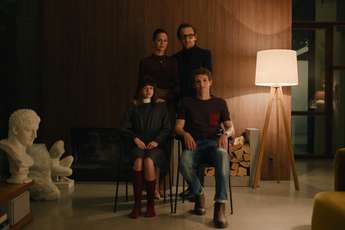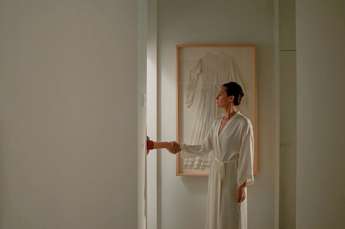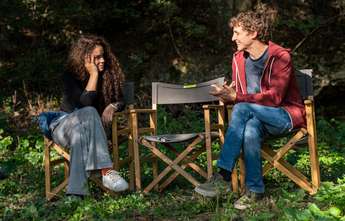Sonja Prosenc’s new film has its world premiere in New York
The festival will take place from 5 to 16 June in Manhattan, New York. Family Therapy will premiere with the film crew in attendance, followed by screenings at several Broadway theatres. The selectors of the American festival said the film was “a highly entertaining, biting satire that is both provocative in its content and daring in its form”.
Starring Katarina Stegnar, Marko Mandič, the promising young actress Mila Bezjak, and the rising star of the French cinema Aliocha Schneider, the younger brother of Niels Schneider, who is best known for Xavier Dolan’s films and Woody Allen’s last film. The film also features Judita Franković Brdar, Jure Henigman, the lead actor of the director’s previous film History of Love, Kristoffer Joner (The Revenant, 2015, Bølgen/The Wawe, 2015, Mission Impossible: Fallout, 2018), singer Ana Djurić – Konstrakta, and Matija Vastl.
Before the world premiere of the film, its director, Sonja Prosenc, commented on the motivations behind it: “When I was a child, our car burnt down on the road. From this childhood memory of cars driving past, Family Therapy was born. Amid chaos and fear, someone else drives past the incinerated vehicle – a shiny new car with a family that seems perfect and does not stop to help. Who are these people who choose not to stop? The film revolves around them, but apart from questioning their actions, it also examines the reasons behind their decisions. Are they afraid of facing their own vulnerability, or is it a learned indifference, a symptom of a broader social condition?”
Sonja Prosenc is known to the national and international film public for her artistic dramas The Tree (2014) and History of Love (2018), both official Slovenian Academy Award submissions, which have attracted the attention of film lovers, critics, and academics with their distinct and profound cinematic language. Studies of her films have been published in academic publications in Europe and the USA, most recently by Berghahn Books, New York, Oxford, while her debut film, The Tree, with a screening in early April 2024, became part of the Anthology Film Archives New York on the occasion of the book’s publication. She has also successfully delved into the comedy genre with her short film Paradise (2019), which won the Vesna Award for Best Short Film at the Festival of Slovenian Film. In her third film, Family Therapy, she combines a sense of comedy with an exceedingly personal cinematic vision.
The film was made by the director’s regular collaborators, including the director of photography Mitja Ličen (Small Body, premiered at the Semaine de la Critique Cannes, with a European Film Academy Award) and the Norwegian sound designer Gisle Tveito (Thelma, 2017, The Worst Person in the World, 2021, and other films by Joachim Trier, Force Majeure by Ruben Östlund, 2014). The music was composed by Primož Hladnik and Boris Benko (Silence) and recorded by the Stavanger Symphony Orchestra in Norway. The film’s main producer is Rok Sečen with the Monoo production company.
On the occasion of this important premiere, Nataša Bučar, the Managing director of the Slovenian Film Centre, stated:
“The selection of Family Therapy for the competition programme of one of the most prominent film festivals on the American continent is a great success for Slovenian film. This achievement also significantly contributes to the Slovenian Film Centre’s goal of increasing the international visibility of Slovenian film creativity. With modest budgets and the small number of films we make in Slovenia, this success is all the more remarkable for us. I am delighted that director Sonja Prosenc has once again proved that she belongs at the very top of world cinema. After successful entries and awards at major European festivals, she has now made a breakthrough on the American continent. Congratulations to the entire film crew.”
In Slovenia, the film’s production was financially supported by the Slovenian Film Centre, along with Viba Film Studio and RTV Slovenija. Italy financed a significant part of the film’s production through the Italian Ministry of Culture and the Friuli Venezia Giulia Film Commission, where a large part of the film was shot. Norway, Croatia, and Serbia also contributed to its development and production. The development was supported by the European Commission’s Creative Europe – MEDIA Programme.


